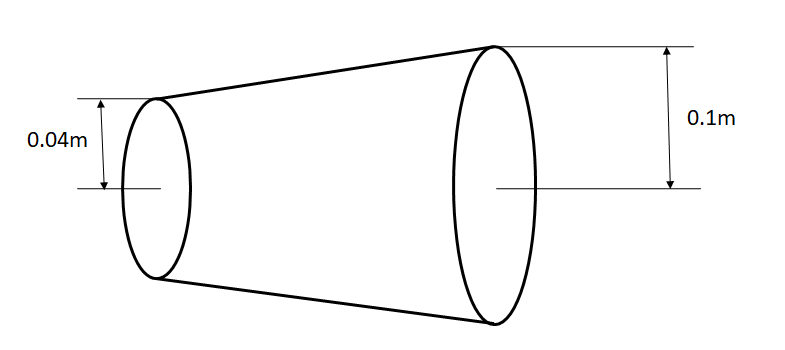Question
Question: Calculate the rate of flow of glycerin of density \( 1.25 \times {10^3}kg/{m^3} \) through the conic...
Calculate the rate of flow of glycerin of density 1.25×103kg/m3 through the conical section of a pipe if the radii of its ends are 0.1m & 0.04m and the pressure drop across its length is 10N/m2 .
Solution
Hint
To solve this question, we have to use the continuity equation and the Bernoulli’s equation. Then, using the formula for the rate of flow in terms of the area and the velocity, we can find it out.
Formula Used:
A1v1=A2v2
P1+ρgh1+21ρv12=P2+ρgh2+21ρv22
Q=Av , here Q is the rate of flow of a fluid through a section having area A and velocity v
Here are A1 and A2 the areas, P1 and P2 the pressures, v1 and v2 the velocities, and h1 and h2 the heights of the section 1 and 2 of a pipe.
Complete step by step answer

From the continuity equation we have
A1v1=A2v2
πr12v1=πr22v2
Separating v2 we get
v2=(r2r1)2v1
According to the question, r1=0.04m and r2=0.1m . Putting these values, we get
v2=(0.10.04)2v1
v2=0.16v1 (1)
From the Bernoulli’s equation we have
P1+ρgh1+21ρv12=P2+ρgh2+21ρv22
As the glycerin flows through the pipe which is horizontal, so we have h1=h2 , which gives
P1+ρgh1+21ρv12=P2+ρgh1+21ρv22
Cancelling ρgh1 from both the sides, we have
P1+21ρv12=P2+21ρv22
Substituting from (1)
P1+21ρv12=P2+21ρ(0.16v1)2
On rearranging the terms, we have
P2−P1=21ρv12−21ρ(0.16v1)2
Taking 21ρv12 common on the RHS
P2−P1=21ρv12(1−0.0256)
P2−P1=0.4872ρv12
According to the question, P2−P1=10N/m2 , and ρ=1.25×103kg/m3 . So, we get
10=0.4872×1.25×103×v12
v12=0.01642
On simplifying, we get
v12=0.0164
v1=0.128m/s
Now we know that the rate of flow is given by
Q=Av
Taking the values at the section 1
Q=A1v1
Q=πr12v1
Substituting the values
Q=π(0.04)2(0.128)
Q=6.43×10−4m3/s
Hence, the rate of flow of glycerin through the given conical section of the pipe is equal to 6.43×10−4m3/s .
Note
Here in this question, we have not been given any information regarding the heights of the two sections of the conical pipe. So we assumed that the pipe should be horizontal. But this is not the case every time. A fluid can flow through the pipe having any configuration.
